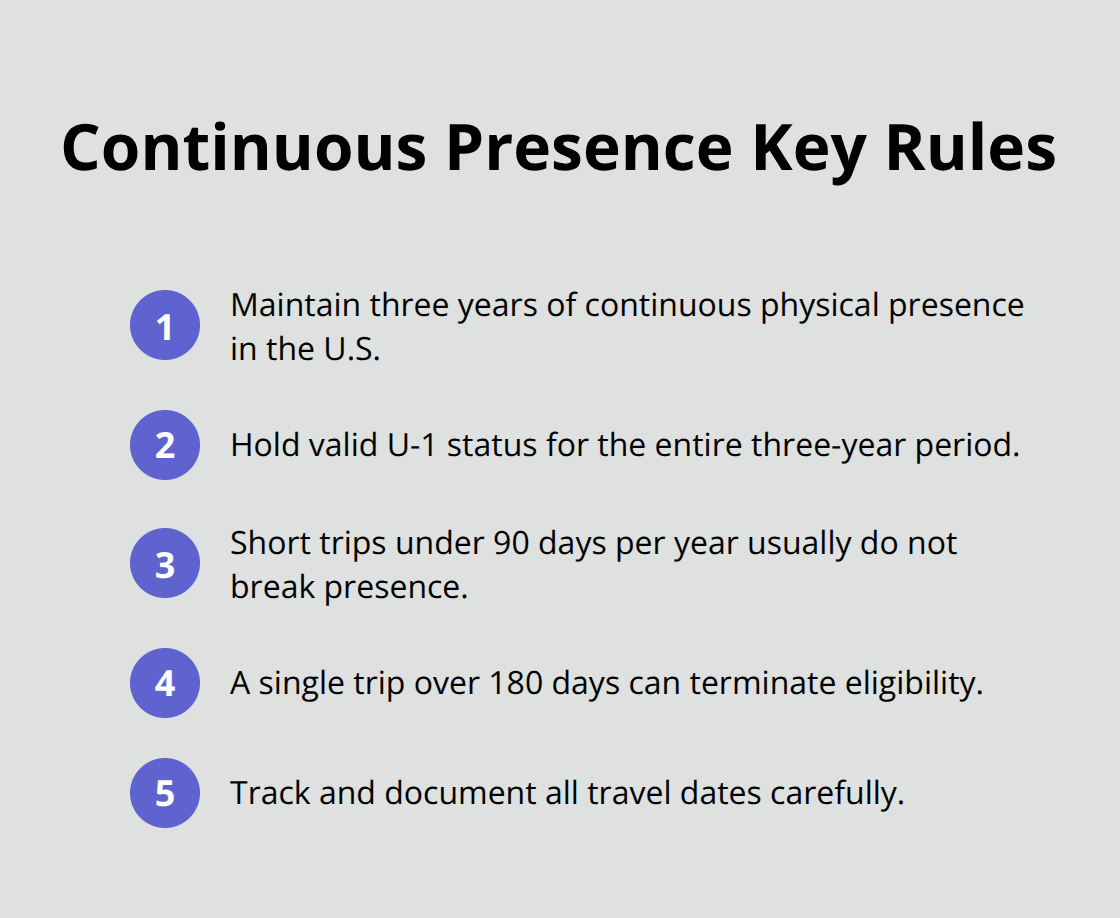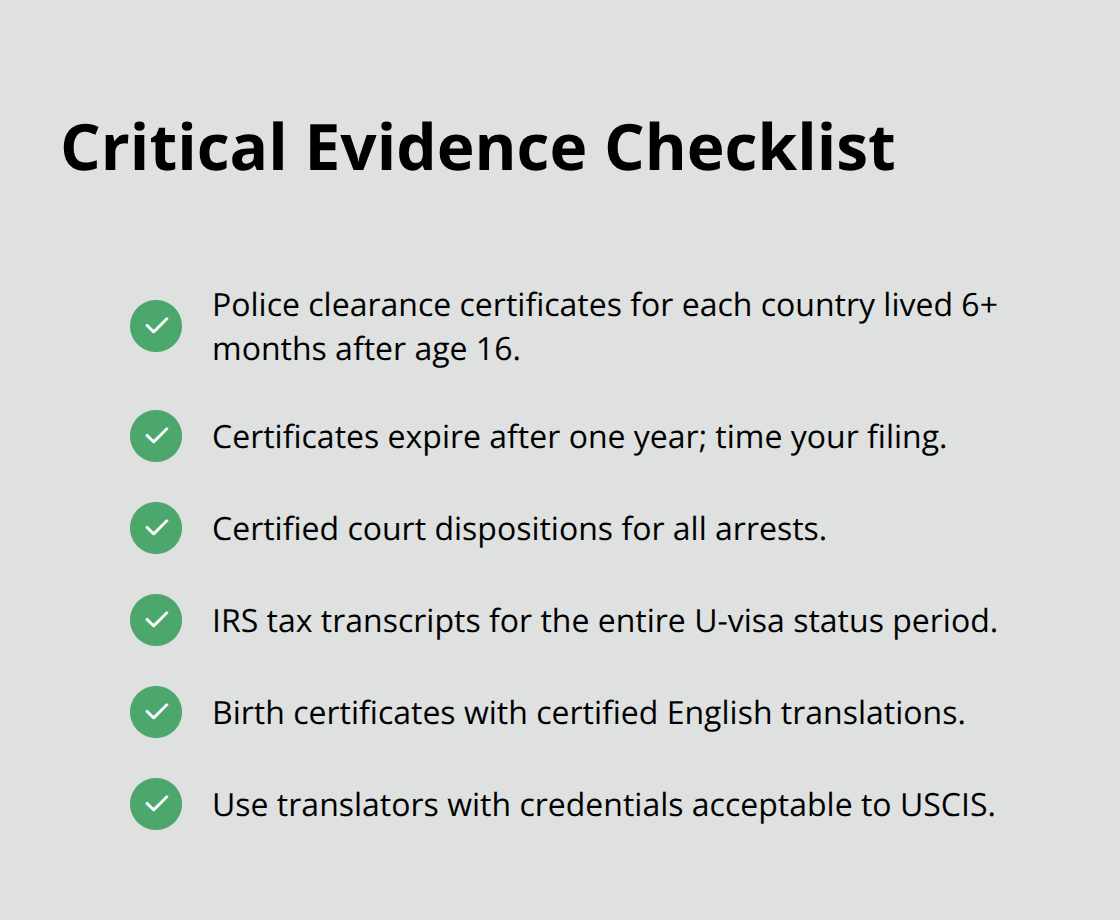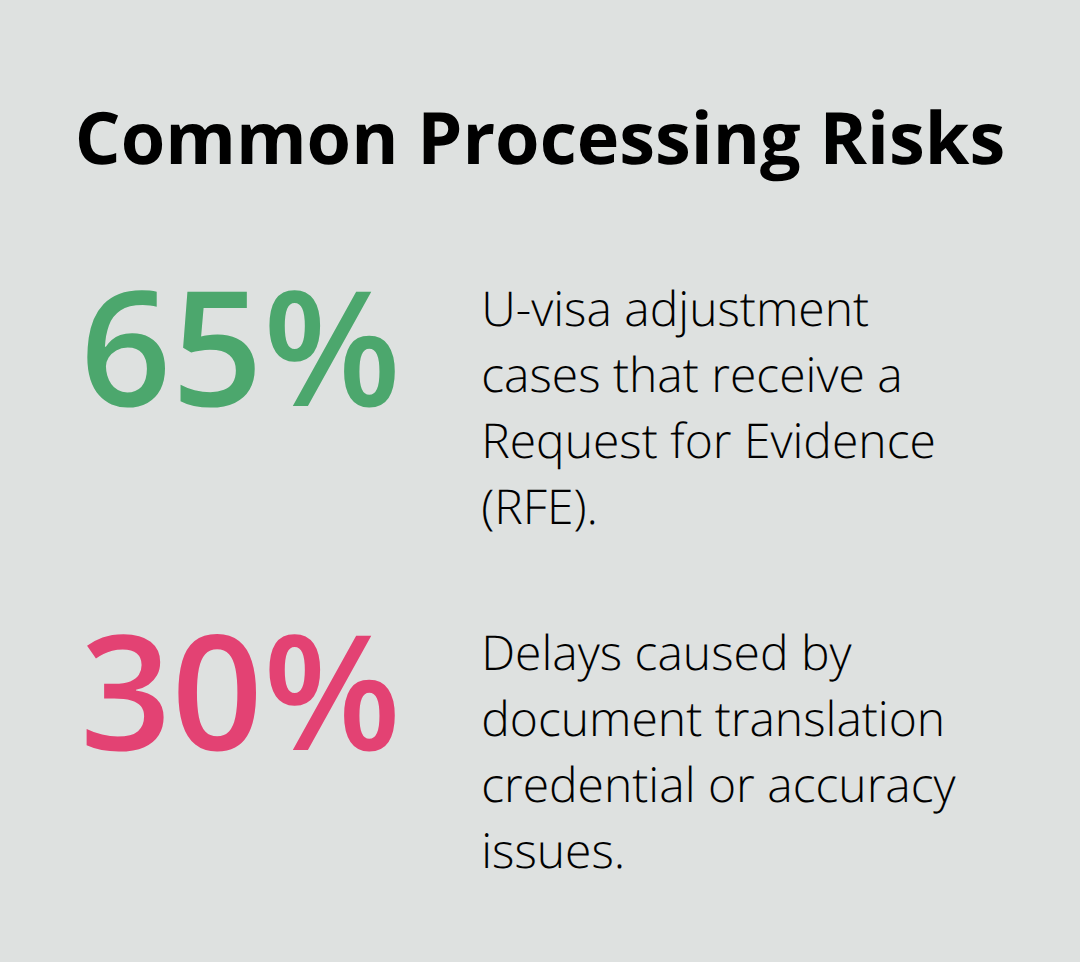
How to Apply for U-Visa Adjustment of Status
U-visa holders who have maintained their status for four years can pursue permanent residency through adjustment of status. This process requires meeting specific eligibility criteria and submitting comprehensive documentation to USCIS.
At Law Offices of Jeffrey A. Thompson, we guide clients through each step of the U-visa adjustment of status application. The timeline typically spans 12-18 months from filing to approval.
Who Qualifies for U-Visa Status Adjustment
The Three-Year Physical Presence Rule
USCIS requires U-visa holders to maintain continuous physical presence in the United States for at least three consecutive years before they file Form I-485. This three-year period must occur while the applicant holds valid U-1 nonimmigrant status. Short trips abroad that total less than 90 days per year typically don’t break continuous presence, but departures that exceed 180 days in a single trip can terminate eligibility. Immigration attorneys track client travel dates meticulously because even brief absences can complicate applications if documentation is inadequate.

Cooperation Requirements That Matter
Active cooperation with law enforcement throughout the investigation or prosecution remains mandatory until USCIS approves the adjustment application. This means applicants must respond to subpoenas, attend court hearings, and provide testimony when authorities request it. USCIS reviews cooperation records extensively during the adjustment process. Applicants who refuse reasonable requests for assistance face immediate denial of their Green Card application. Law enforcement agencies must confirm ongoing cooperation through updated certifications, which attorneys help coordinate with prosecutors and investigating officers.
Character Assessment Standards
USCIS evaluates moral character during the entire period of U-visa status, not just the three years before filing. Traffic violations under $500 typically don’t affect applications, but any arrests or criminal charges require detailed explanations and supporting documentation. Tax compliance becomes particularly important – applicants must file all required returns and pay any outstanding obligations before approval (including state and federal taxes). FBI background checks and court records should be obtained early in the process because character issues often require additional evidence and legal arguments to overcome potential obstacles.
The documentation requirements for U-visa adjustment applications extend far beyond basic eligibility criteria and require careful preparation.
What Documents Do You Need for U-Visa Adjustment
Form I-485 Preparation Strategy
The Form I-485 application demands meticulous attention to detail because USCIS rejects incomplete submissions without review. As of November 2023, the revised form requests significantly more information than previous versions, including detailed employment history for the past five years and comprehensive travel records. We recommend that you complete the form in sections over several days rather than rush through it in one session. Common rejection triggers include unsigned forms, missing pages, and inconsistent dates across documents. The mandatory electronic payment system requires credit or debit cards – USCIS no longer accepts checks or money orders for fees.
Critical Evidence Requirements
Police clearance certificates from every country where you lived for six months or more after age 16 must accompany your application. These certificates expire after one year, so you must time your application carefully. Court dispositions for all arrests, regardless of outcome, require certified copies directly from the court clerk – photocopies or online printouts face automatic rejection.

Tax transcripts from the IRS that cover the entire period of U-visa status demonstrate good moral character more effectively than tax returns alone. Birth certificates must include English translations from certified translators (USCIS maintains a strict list of acceptable translation credentials).
Medical Examination Standards
Form I-693 completed by USCIS-designated civil surgeons after November 1, 2023 no longer expires, which saves applicants from repeat examinations during delays. The medical examination costs between $200-500 depending on required vaccinations and location. Missing vaccinations trigger automatic requests for evidence that delay applications by 60-90 days. Civil surgeons must review vaccination records before the appointment, so you should gather all childhood immunization documents beforehand. Mental health evaluations become necessary only when applicants disclose psychiatric treatment history on their forms, but complete honesty prevents later complications during interviews.
Document Organization Tips
You should organize all documents chronologically and create copies of everything before submission. USCIS requires original documents for certain items like birth certificates and marriage licenses. Translation requirements apply to any document not in English (certified translators must provide their credentials and contact information). Missing signatures on any form result in immediate rejection, so double-check every page before submission.
The application process itself follows a structured timeline that begins once USCIS receives your complete documentation package.
How Long Does U-Visa Adjustment Take
Filing Timeline and Processing Reality
USCIS processing times for U-visa adjustment applications vary by service center and form type, as specific processing timeframes may no longer reference particular service center locations. Applications face delays during peak filing periods between March and June, with additional processing time of 3-6 months beyond standard timeframes. Electronic submission through the USCIS online portal reduces initial delays by 2-3 weeks compared to paper applications. Your receipt notice arrives within 7-10 business days after electronic submission, but paper applications can take up to 30 days for acknowledgment. Priority date availability doesn’t affect U-visa adjustments since no annual caps apply (unlike other adjustment categories that face years-long waits).
Biometrics and Interview Preparation Strategy
Biometrics appointments typically occur 4-6 weeks after USCIS receives your application, with notices that arrive 2 weeks before your appointment date. Missed biometrics appointments delay cases by 60-90 days minimum because rescheduled appointments require written requests and justification. Interview notices arrive 30-45 days before scheduled dates, which gives applicants limited preparation time. USCIS conducts interviews for approximately 40% of U-visa adjustment cases, with focus on applicants who have complex criminal histories or cooperation concerns. Interview preparation should include review of every detail on your Form I-485 and collection of updated evidence of law enforcement cooperation. Practice explanation of your victimization experience concisely because officers often ask detailed questions about the crime. Bring original documents to interviews even if you submitted copies previously – USCIS officers frequently request verification of evidence during face-to-face meetings. Review common USCIS adjustment of status interview questions to prepare effectively.
Common Processing Delays and Solutions
Request for Evidence notices arrive in 65% of U-visa adjustment cases, most commonly for updated police clearances or additional cooperation documentation. RFE responses must be submitted within 87 days, and incomplete responses trigger denials without appeal options. Medical examination delays occur when civil surgeons discover missing vaccinations or health conditions that require treatment before completion. Document translation issues cause 30% of delays when USCIS questions translator credentials or accuracy.

Address changes during the process require immediate notification through Form AR-11 within 10 days, or you risk missing correspondence that could result in application abandonment. Understanding adjustment of status costs helps budget for potential additional expenses during delays.
Final Thoughts
U-visa adjustment of status demands precise attention to documentation, cooperation requirements, and continuous presence rules. The three-year physical presence requirement, complete Form I-485 preparation, and medical examination coordination create the foundation for approval. USCIS processes these applications within 12-18 months when applicants submit complete documentation packages.
Professional legal guidance helps navigate this complex immigration process effectively. Immigration attorneys track cooperation requirements, organize evidence, and respond to USCIS requests promptly. They also coordinate with law enforcement agencies to maintain the cooperation certifications that USCIS requires throughout the adjustment process.
USCIS approves adjustment applications and issues Green Cards within 30-45 days of final approval. Permanent residents become eligible for citizenship after five years of continuous residence (with some exceptions for military service members). Contact our experienced immigration team to begin your adjustment application with professional support and guidance.


